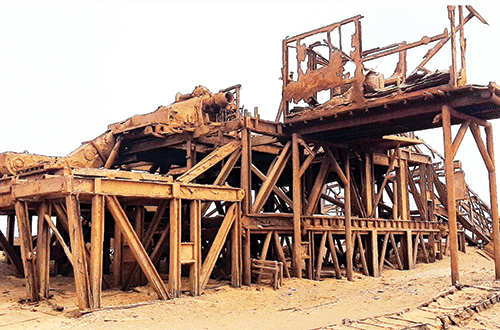WALVIS BAY – An oversight visit to determine the veracity of the existence of diamond deposits and mining activities taking place in the Skeleton Coast Park, hit a brickwall.
This is after officials from the Mines and Energy Ministry refused to cooperate and provide documentation on the alleged mining activities to the Parliamentary Standing Committee on Economics and Public Administration undertaking an oversight visit to the Skeleton Coast Park.
The park stretches between the Erongo and Kunene regions, and the oversight visit was in August last year.
The aim was to determine whether there were diamond deposits or mining operations taking place and how Namibians can benefit from these operations.
The committee was composed of parliamentarians Bertha Dinyando, Elifas Dingara (both Swapo), Reginald Diergaardt (Popular Democratic Movement) Jan Mukwiilongo (Namibia Economic Freedom Fighters) and Kennedy Shekupakela of the Rally for Democracy and Progress.
They were also accompanied on the trip by the deputy mines minister Cornelia Shilunga, a report tabled by the committee in the National Assembly this week revealed.
In the report, the committee indicated that the mines ministry refused to disclose information on the alleged clandestine mining operations taking place at Skeleton Coast Park.
Worryingly, employees responsible for mining did not fully cooperate, hindering the effectiveness of their oversight visit, the committee says.
“Employees responsible for mining do not understand the importance of Article 63 of the Namibian Constitution, and as a result, they refused to provide the required documents and needed information to the committee, therefore hampering the effectiveness of the oversight visit, and the constitutional oversight power of Parliament over the Executive,” the report states.
Also, no documentation has been provided to the committee to date, which would have been key in their fact-finding mission.
The report further reveals that all the documents in this regard were and are still “confidential”, and cannot be made available to Parliament for inspection.
“The ministry appeared not to understand the importance of providing the committee with all necessary records indicating the economic value of the resources available in the Skeleton Coast of Namibia,” the report reads.
The committee also highlighted that during the visit, none of the mining companies were operational. They were also informed that all mining companies closed, vacated, and intend to return to the sites only if their licences were renewed.
The committee added that the outcome of their investigation is incomplete since employees of the mines and energy ministry appeared to be less informed or were afraid to speak out properly to inform the committee of the situation on the ground.
“Diamonds are one of the most important resources of the country. However, there are no measures at the national park to control and protect the resources of the country,” the committee said.
Over the years, talk has been that diamond mining operations are taking place at or along Skeleton Coast Park, particularly at an area known as the Kunene River Mouth. But Namibians benefit nothing from these operations, it has been alleged.
Recommendations
The committee is now recommending that training be provided to all government staff members, including state-owned enterprises, to understand and respect the constitutional mandate of Parliament.
They also recommended that the ministry should not renew any mining licences for mining operations in the Skeleton Coast Park.
This, the committee argues, will give them ample time to verify the facts as to why the ministry is hiding key pieces of information and documentation.
They also recommended that the mines and environment ministries, together with the Namibian Police, strengthen synergy at the Skeleton Coast Park. “Strict measures applied at diamond areas worldwide must be adhered to and implemented to safeguard the country’s resources. The ministry must ensure that the area is properly fenced off, and that there are security officers at possible diamond deposit sites, all the time,” the committee said.
Responding to questions, a spokesperson informed this publication that the ministry is yet to determine whether they have received the report in question or not.
“I will have to come back to you once I familiarise myself with the report,” mines spokesperson Ten Hasheela said.
– edeklerk@nepc.com.na



